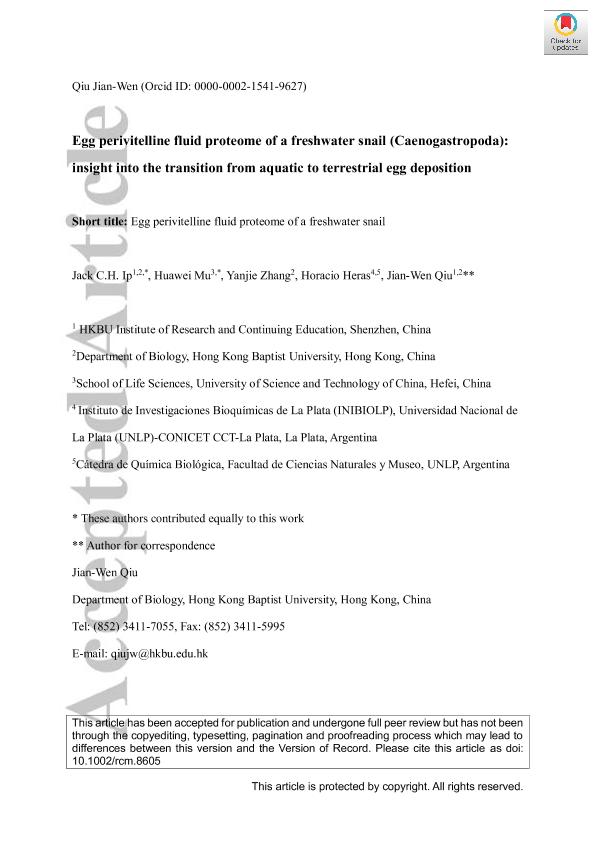Artículo
Egg perivitelline fluid proteome of a freshwater snail: Insight into the transition from aquatic to terrestrial egg deposition
Fecha de publicación:
28/10/2019
Editorial:
John Wiley & Sons Ltd
Revista:
Rapid Communications in Mass Spectrometry
ISSN:
0951-4198
Idioma:
Inglés
Tipo de recurso:
Artículo publicado
Clasificación temática:
Resumen
Rationale: Proteins from the egg perivitelline fluid (PVF) are assumed to play critical roles in embryonic development, but for many groups of animals their identities remain unknown. Identifying egg PVF proteins is a critical step towards understanding their functions including their roles in evolutionary transition in habitats. Methods: We applied proteomic and transcriptomic analysis to investigate the PVF proteome of the eggs of Pomacea diffusa, an aerial ovipositing freshwater snail in the family Ampullariidae. The PVF proteins were separated with the sodium dodecyl sulfate polyacrylamide gel electrophoresis (SDS-PAGE) method, and proteomic analysis was conducted using an LTQ Velos ion trap mass spectrometer coupled with liquid chromatography. Comparison of PVF proteomes and evolution analyses was performed between P. diffusa and other ampullariids. Results: In total, 32 egg PVF proteins were identified from P. diffusa. They were categorized as PV1-like subunits, immune-responsive proteins, protein degradation, signaling and binding, transcription and translation, metabolism, oxidation–reduction and proteins with unknown function. Interestingly, the proteome includes a calcium-binding protein important in forming the hard eggshell that enabled the terrestrial transition. However, it does not include PV2, a neurotoxic protein that was assumed to be present in all Pomacea species. Conclusions: The PVF proteome data from P. diffusa can help us better understand the roles that reproductive proteins played during the transition from underwater to terrestrial egg deposition. Moreover, they could be useful in comparative studies of the terrestrialization in several groups of animals that occurred independently during their evolution.
Palabras clave:
apple snail
,
Egg perivitellinne
,
Positive selection
,
Terrestrial eggs
Archivos asociados
Licencia
Identificadores
Colecciones
Articulos(INIBIOLP)
Articulos de INST.DE INVEST.BIOQUIMICAS DE LA PLATA
Articulos de INST.DE INVEST.BIOQUIMICAS DE LA PLATA
Citación
Ip, Jack Chi Ho ; Mu, Huawei; Zhang, Yanjie; Heras, Horacio; Qiu, Jian Wen; Egg perivitelline fluid proteome of a freshwater snail: Insight into the transition from aquatic to terrestrial egg deposition; John Wiley & Sons Ltd; Rapid Communications in Mass Spectrometry ; 34; 7; 28-10-2019; 1-25
Compartir
Altmétricas




